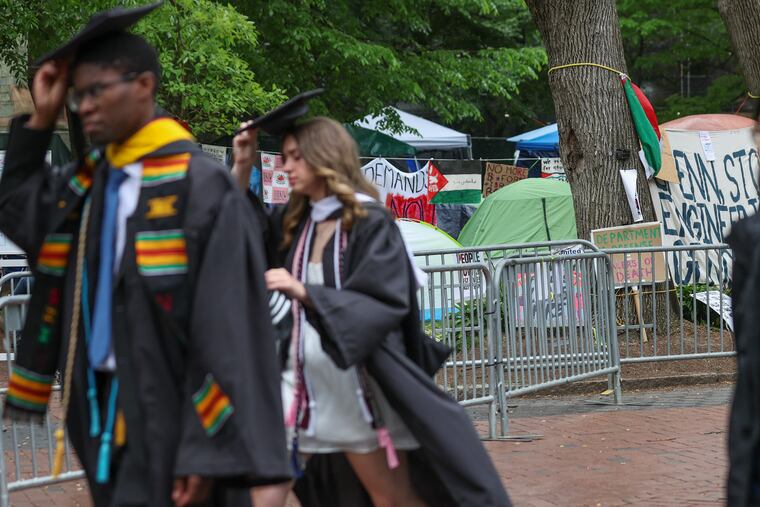Faculty senate committee urged Penn to ‘de-escalate tensions’ and ‘find a negotiated resolution’
The pro-Palestinian encampment on the College Green reached its 10th day.

At a special meeting of the University of Pennsylvania faculty senate executive committee Monday, members expressed differing views about the pro-Palestinian encampment but concurred that the university should work to “deescalate tensions” and “find a negotiated resolution.”
That’s according to a summary of the meeting published in the university’s almanac. No formal action was adopted, though proposals were discussed. Another meeting is scheduled for Thursday.
But separately, faculty senate chair Tulia Falleti, concerned about mounting tension and the university’s request to the city for police resources, if necessary, wrote an op-ed Saturday urging Penn to follow the example of other colleges that have negotiated agreements with protesters in recent days. Rutgers, Brown and Northwestern Universities are among those that have struck agreements, though in some cases they are already facing criticism from some Jewish groups and legislators for doing so.
» READ MORE: While a few other universities reach compromises with protesters, why can’t Penn?
“Today, I am proud to be a professor at Penn and not a professor at Columbia University, at Emory University, or any of the other universities who have sent riot police to forcefully remove and arrest their students, staff and faculty from their encampments and lawns,” Falleti wrote, emphasizing that she is not speaking for the faculty senate, but as an individual.
More than 2,000 students have been arrested nationwide since the protests started last month, according to the New York Times.
» READ MORE: Is the call to divest feasible? Here’s why there are hurdles to Penn protesters’ demands.
Falleti’s comments come as the encampment continues for the 10th day, amid a swirl of speculation over whether Penn will pursue a negotiated agreement, move to end the encampment with force, or allow it to continue. No matter its course, the university likely will face criticism, with some urging that the school allow the encampment, with about 35 tents and 60 protesters, to stand and others calling for its removal.
On Friday morning outside Falleti’s campus office at 36th and Walnut Streets, a billboard truck played a video loop of the Oct. 7 Hamas terrorist attack on Israel, she wrote in her piece.
“These were horrific and painful images and sounds,” said Falleti, a political science professor and director of the Center for Latin American and Latinx Studies.
» READ MORE: Penn’s Hey Day, a decades-old student tradition, rerouted as pro-Palestinian encampment enters second week
But she said that what also keeps her awake at night is that the same kind of billboards were on campus last semester, which ended with the resignation of former Penn president Liz Magill after a bipartisan uproar over her congressional testimony about the university’s handling of antisemitism on campus. It was never clear who was paying for the digital billboards calling for Magill’s resignation, which came amid one of the greatest crises in leadership that Penn has ever experienced and also coincided with former board chair Scott L. Bok’s resignation.
» READ MORE: The pro-Palestinian encampment at Penn has become a game of cat and mouse between protesters and administrators
“I fear that it forebodes another traumatic crisis on campus,” Falleti wrote. “The billboard trucks at Penn, just like the airplane that flew over the Harvard University and Massachusetts Institute of Technology campuses in early December, are part of a concerted external political campaign against higher education institutions, against academic freedom, against open expression, and in the case of our university against a peaceful protest of students, staff, faculty, and local community members.”
Falleti wrote that she has walked around the perimeter of the encampment several times a day, every day.
“I have witnessed with my own eyes that this is a peaceful protest of Penn students, staff, and faculty,” she wrote.
She acknowledged that she has heard from Jewish students and staff that they prefer not to walk by the encampment, which she said she understands.
“As an educational community, however, we cannot move forward by silencing or censoring debate and dissent,” she wrote. “We must make room (both physically and symbolically) to encourage these conversations with open minds and hearts.”
She praised police for de-escalating tensions on Thursday when larger crowds of protesters and counterprotesters were gathered around the College Green. The university in a statement on Thursday said that during the prior evening, more than 100 protesters were at the site and that a rally escalated into the early morning hours “including defacement of Penn property, an unauthorized drone, and threatening rhetoric and chants.”
» READ MORE: Student protests over Gaza war are forcing Penn and other U.S. universities to face ‘impossible’ demands
The faculty senate committee discussed that “every effort should be made” to hold commencement on May 20 and other year-end activities even if they must be relocated. On Thursday, the university diverted its traditional Hey Day procession for rising seniors so that it would not end on College Green.
The university has not responded to a question on how it would handle commencement, which is scheduled to take place at Franklin Field.
Falleti said she does not want the billboard trucks deciding what happens next.
“I look forward to tomorrow being another day of peaceful encampment protest at Penn,” she wrote, “and to our university administration negotiating in good faith with our students.”
Here is Falleti’s op-ed piece in its entirety: